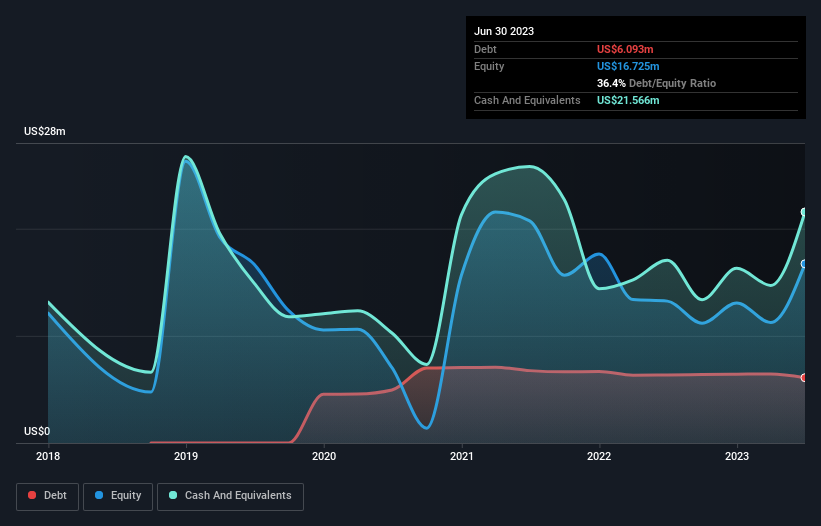- United States
- /
- Pharma
- /
- NasdaqGM:ETON
Here's Why Eton Pharmaceuticals (NASDAQ:ETON) Can Manage Its Debt Despite Losing Money

David Iben put it well when he said, 'Volatility is not a risk we care about. What we care about is avoiding the permanent loss of capital.' So it seems the smart money knows that debt - which is usually involved in bankruptcies - is a very important factor, when you assess how risky a company is. Importantly, Eton Pharmaceuticals, Inc. (NASDAQ:ETON) does carry debt. But the real question is whether this debt is making the company risky.
When Is Debt Dangerous?
Generally speaking, debt only becomes a real problem when a company can't easily pay it off, either by raising capital or with its own cash flow. Part and parcel of capitalism is the process of 'creative destruction' where failed businesses are mercilessly liquidated by their bankers. However, a more common (but still painful) scenario is that it has to raise new equity capital at a low price, thus permanently diluting shareholders. Having said that, the most common situation is where a company manages its debt reasonably well - and to its own advantage. The first step when considering a company's debt levels is to consider its cash and debt together.
See our latest analysis for Eton Pharmaceuticals
What Is Eton Pharmaceuticals's Debt?
As you can see below, Eton Pharmaceuticals had US$6.09m of debt at June 2023, down from US$6.36m a year prior. But on the other hand it also has US$21.6m in cash, leading to a US$15.5m net cash position.

How Strong Is Eton Pharmaceuticals' Balance Sheet?
We can see from the most recent balance sheet that Eton Pharmaceuticals had liabilities of US$9.59m falling due within a year, and liabilities of US$4.62m due beyond that. On the other hand, it had cash of US$21.6m and US$3.08m worth of receivables due within a year. So it actually has US$10.4m more liquid assets than total liabilities.
This short term liquidity is a sign that Eton Pharmaceuticals could probably pay off its debt with ease, as its balance sheet is far from stretched. Succinctly put, Eton Pharmaceuticals boasts net cash, so it's fair to say it does not have a heavy debt load! When analysing debt levels, the balance sheet is the obvious place to start. But it is future earnings, more than anything, that will determine Eton Pharmaceuticals's ability to maintain a healthy balance sheet going forward. So if you're focused on the future you can check out this free report showing analyst profit forecasts.
Over 12 months, Eton Pharmaceuticals reported revenue of US$29m, which is a gain of 77%, although it did not report any earnings before interest and tax. Shareholders probably have their fingers crossed that it can grow its way to profits.
So How Risky Is Eton Pharmaceuticals?
While Eton Pharmaceuticals lost money on an earnings before interest and tax (EBIT) level, it actually generated positive free cash flow US$4.7m. So although it is loss-making, it doesn't seem to have too much near-term balance sheet risk, keeping in mind the net cash. Keeping in mind its 77% revenue growth over the last year, we think there's a decent chance the company is on track. We'd see further strong growth as an optimistic indication. The balance sheet is clearly the area to focus on when you are analysing debt. However, not all investment risk resides within the balance sheet - far from it. For example - Eton Pharmaceuticals has 1 warning sign we think you should be aware of.
If you're interested in investing in businesses that can grow profits without the burden of debt, then check out this free list of growing businesses that have net cash on the balance sheet.
Valuation is complex, but we're here to simplify it.
Discover if Eton Pharmaceuticals might be undervalued or overvalued with our detailed analysis, featuring fair value estimates, potential risks, dividends, insider trades, and its financial condition.
Access Free AnalysisHave feedback on this article? Concerned about the content? Get in touch with us directly. Alternatively, email editorial-team (at) simplywallst.com.
This article by Simply Wall St is general in nature. We provide commentary based on historical data and analyst forecasts only using an unbiased methodology and our articles are not intended to be financial advice. It does not constitute a recommendation to buy or sell any stock, and does not take account of your objectives, or your financial situation. We aim to bring you long-term focused analysis driven by fundamental data. Note that our analysis may not factor in the latest price-sensitive company announcements or qualitative material. Simply Wall St has no position in any stocks mentioned.
About NasdaqGM:ETON
Eton Pharmaceuticals
A specialty pharmaceutical company, focuses on developing, acquiring, and commercializing pharmaceutical products for rare diseases.
High growth potential with adequate balance sheet.

